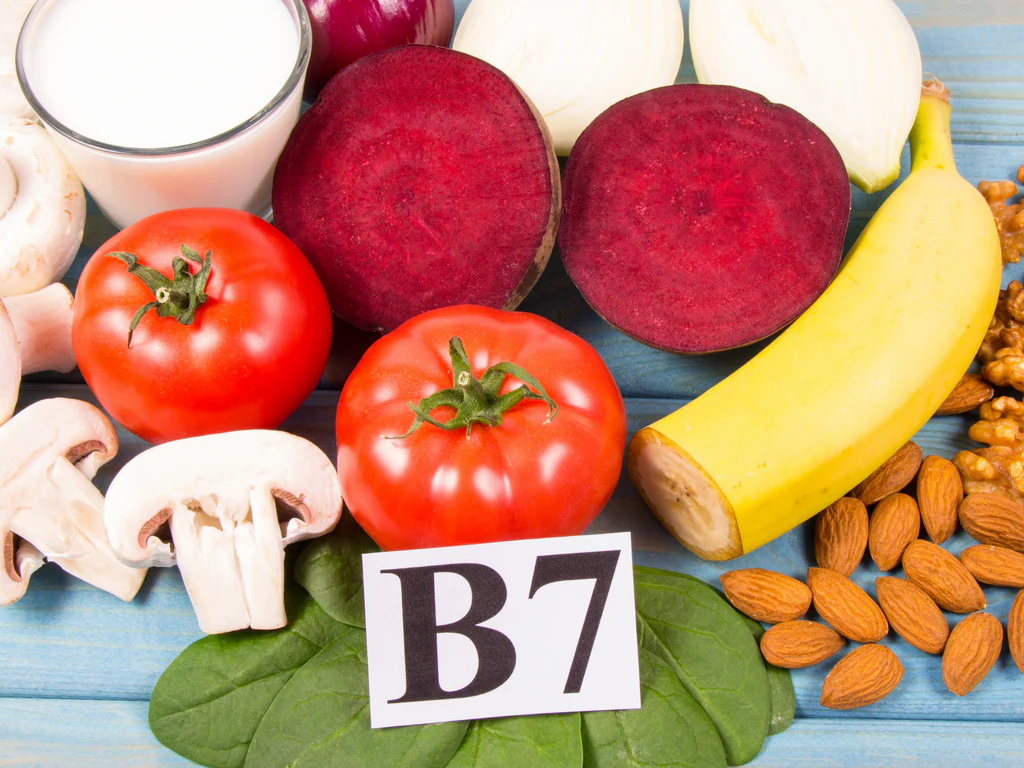Benefits of Vitamin B7
Introduction
Vitamin B7, commonly known as biotin, is a water-soluble vitamin that plays a critical role in maintaining the health of your hair, skin, and nails. It is also vital for various metabolic processes in the body. Despite its importance, biotin is often overlooked compared to other vitamins. This comprehensive guide aims to explore the many benefits of Vitamin B7, its sources, recommended intake, symptoms of deficiency, and answer some frequently asked questions about this essential nutrient.
What is Vitamin B7?
Vitamin B7, or biotin, is a member of the B-complex vitamins, which are essential nutrients required for various metabolic processes in the body. Biotin acts as a coenzyme in the metabolism of fatty acids, amino acids, and glucose. It helps in converting food into energy, which is vital for maintaining overall health.
Chemical Structure
Biotin has a unique structure that includes a ureido (tetrahydroimidizalone) ring fused with a tetrahydrothiophene ring. This complex structure is crucial for its role as a coenzyme.
Biological Functions
Biotin is involved in several key biological processes
- Energy Production: Helps convert carbohydrates into glucose, which the body uses for energy.
- Metabolism of Macronutrients: Aids in the breakdown of fats and proteins.
- Gene Regulation: Plays a role in gene expression by regulating the transcription of certain genes.
- Cell Signaling: Participates in cell signaling pathways that are crucial for maintaining cellular functions.
Benefits of Vitamin B7
Promotes Healthy Hair
One of the most well-known benefits of biotin is its ability to promote healthy hair. Biotin is often included in hair growth supplements and shampoos due to its role in keratin production, a protein that makes up hair.
Scientific Evidenc
A study published in the Journal of Clinical and Aesthetic Dermatology found that women with thinning hair who took a biotin supplement experienced significant hair growth compared to those who took a placebo.
Supports Skin Health
Biotin deficiency can lead to skin problems such as rashes, acne, and dermatitis. Adequate levels of biotin help maintain healthy skin by promoting the production of fatty acids that nourish the skin.
Scientific Evidence
Research has shown that biotin supplementation can improve skin hydration and smoothness. According to a study in the International Journal of Cosmetic Science, biotin helps improve skin’s lipid content, leading to healthier and more hydrated skin.
Strengthens Nails
Brittle and weak nails are often a sign of biotin deficiency. Biotin supplementation has been shown to improve nail strength and thickness, reducing the incidence of breakage and splitting.
Scientific Evidence
A study published in the Journal of the American Academy of Dermatology found that biotin supplements increased nail thickness by 25% in individuals with brittle nails.
Enhances Metabolic Function
Biotin plays a crucial role in the metabolism of carbohydrates, fats, and proteins. It acts as a coenzyme for carboxylases, enzymes involved in the synthesis and breakdown of macronutrients.
Scientific Evidence
According to the National Institutes of Health (NIH), biotin is essential for the activity of enzymes that catalyze critical steps in fatty acid synthesis, gluconeogenesis, and amino acid catabolism.
Supports Pregnancy and Breastfeeding
Biotin is particularly important during pregnancy and breastfeeding. It supports the health of the mother and the development of the fetus, especially in the formation of the baby’s skin, hair, and nervous system.
Scientific Evidence
The American Pregnancy Association highlights the importance of biotin during pregnancy, stating that pregnant women may require higher levels of biotin due to increased metabolic demands.
Aids in Blood Sugar Regulation
Biotin, in combination with chromium, has been shown to help regulate blood sugar levels, making it beneficial for individuals with diabetes or insulin resistance.
Scientific Evidence
A study published in Diabetes Technology & Therapeutics found that biotin supplementation improved glycemic control in patients with type 2 diabetes.
Supports Brain Function and Mental Health
Biotin is involved in neurotransmitter activity and plays a role in maintaining cognitive function and mental health. Adequate levels of biotin are necessary for proper brain function.
Scientific Evidence
Research in the field of neuroscience suggests that biotin deficiency can lead to neurological symptoms such as depression, lethargy, and hallucinations. Supplementation can help alleviate these symptoms and support overall mental health.
Sources of Vitamin B7
Animal-Based Foods
Biotin is naturally found in various animal-based foods, including
- Egg Yolks: A rich source of biotin.
- Liver and Kidney: Organ meats are high in biotin.
- Fish: Particularly salmon and tuna.
- Dairy Products: Milk, cheese, and yogurt contain biotin.
Plant-Based Foods
For vegetarians and vegans, there are several plant-based sources of biotin, such as
- Nuts and Seeds: Almonds, peanuts, and sunflower seeds.
- Legumes: Soybeans, peas, and lentils.
- Whole Grains: Oats, barley, and wheat germ.
- Vegetables: Sweet potatoes, spinach, and broccoli.
Supplements
Biotin supplements are available in various forms, including tablets, capsules, and liquid drops. These supplements are especially useful for individuals with dietary restrictions or increased biotin needs.
Recommended Intake of Vitamin B7
Daily Recommended Intake
The recommended daily intake of biotin varies by age and life stage
- Infants (0-6 months): 5 mcg
- Infants (7-12 months): 6 mcg
- Children (1-3 years): 8 mcg
- Children (4-8 years): 12 mcg
- Children (9-13 years): 20 mcg
- Teens (14-18 years): 25 mcg
- Adults (19+ years): 30 mcg
- Pregnant Women: 30 mcg
- Breastfeeding Women: 35 mcg
Factors Influencing Biotin Absorption
Several factors can influence the absorption of biotin, including
- Age: Absorption may decrease with age.
- Medical Conditions: Conditions such as inflammatory bowel disease (IBD) can impair absorption.
- Medications: Certain medications, like anticonvulsants, can interfere with biotin absorption.
Vitamin B7 Deficiency
Causes of Deficiency
Biotin deficiency can be caused by various factors, including
- Dietary Insufficiency: Inadequate intake of biotin-rich foods.
- Genetic Disorders: Biotinidase deficiency, a genetic disorder that affects biotin metabolism.
- Excessive Raw Egg Consumption: Raw egg whites contain avidin, a protein that binds to biotin and prevents its absorption.
- Long-term Use of Certain Medications: Such as anticonvulsants and antibiotics.
Symptoms of Deficiency
The symptoms of biotin deficiency can range from mild to severe and may include
- Hair Loss: Thinning hair or alopecia.
- Skin Issues: Rashes, dermatitis, and seborrheic dermatitis.
- Neurological Symptoms: Depression, lethargy, hallucinations, and numbness or tingling in the extremities.
- Brittle Nails: Weak and splitting nails.
- Muscle Pain: Muscle cramps and pain.
Diagnosis and Treatment
Biotin deficiency is diagnosed through clinical evaluation and blood tests that measure biotin levels. Treatment typically involves dietary adjustments to include more biotin-rich foods or supplementation, depending on the severity of the deficiency and underlying causes.
Frequently Asked Questions (FAQs)
What are the benefits of taking Vitamin B7 supplements
Vitamin B7 supplements can help prevent or treat deficiency, promoting healthy hair, skin, and nails, supporting metabolic function, enhancing brain health, and aiding in blood sugar regulation. They are particularly beneficial for individuals with dietary restrictions or increased biotin needs.
Can you get too much Vitamin B7
Vitamin B7 has a low potential for toxicity, and excess amounts are typically excreted in urine. However, extremely high doses may cause mild side effects in some individuals, such as skin rashes or digestive issues.
Is it necessary for vegetarians and vegans to take Vitamin B7 supplements
While biotin can be found in some plant-based foods, vegetarians and vegans may benefit from supplements to ensure they meet their daily requirements, especially if their diet lacks sufficient biotin-rich foods.
How long does it take to see the benefits of Vitamin B7 supplementation
The time it takes to see benefits from biotin supplementation varies depending on the individual and the deficiency severity. Improvements in hair, skin, and nails can typically be observed within a few weeks to months of consistent supplementation.
Can Vitamin B7 help with weight loss
While Vitamin B7 supports metabolic function, there is no direct evidence to suggest that it significantly aids in weight loss. However, it may help improve overall energy levels and metabolism, supporting a healthier lifestyle.
Is Vitamin B7 supplementation safe during pregnancy
Yes, Vitamin B7 supplementation is safe and recommended during pregnancy, as adequate levels are crucial for fetal development and maternal health. Pregnant women should consult their healthcare provider for appropriate dosages.
Can biotin supplements improve hair growth
Biotin supplements can improve hair growth and strength, particularly in individuals with biotin deficiency. Adequate biotin levels support keratin production, promoting healthier and stronger hair.
Conclusion
Vitamin B7, or biotin, is an essential nutrient with numerous health benefits, ranging from promoting healthy hair, skin, and nails to supporting metabolic and cognitive functions. Ensuring adequate biotin intake through diet or supplements is crucial for maintaining overall health and preventing deficiency-related symptoms. By understanding the importance of biotin and taking proactive steps to maintain its levels, individuals can significantly enhance their wellbeing and quality of life.
- Best THC-O Products Reviewed - July 26, 2024
- Best THC-JD Products Reviewed - July 26, 2024
- Best THC-H Products Reviewed - July 26, 2024

